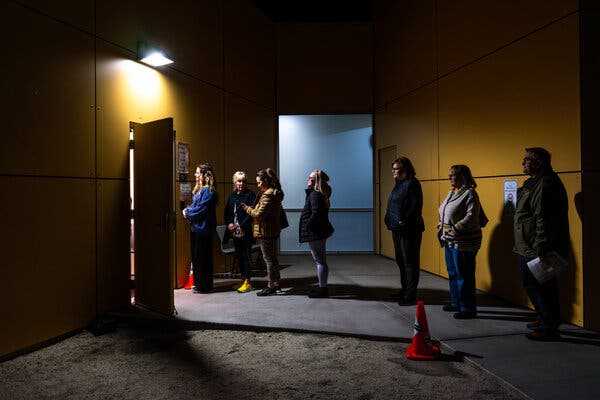Some counties have a history of refusing to certify election results. Others have tried to disqualify voters or prevent them from casting absentee ballots.
Listen to this article · 8:45 min Learn more
- Share full article

Voting in Reno, in Nevada’s Washoe County, during the primary election earlier this year. The county’s three Republican commissioners opposed the certification of two recounts of the local primary results earlier this year.
Voting rights groups are keeping tabs on roughly two dozen counties as potential hot spots for electoral discord, places that in recent cycles have seen pushback on the certification of results or efforts to disqualify some ballots or common election procedures.
The counties have repeatedly found themselves at the center of legal disputes, some aimed at overturning former President Donald J. Trump’s defeat in the 2020 election.
These are some of the places that democracy watchdogs are closely monitoring:
Arizona
-
Cochise County: This deeply Republican area in the southeastern part of the state has been a cauldron of election-driven conspiracy theories, recycled by the former president’s supporters. Officials there refused to certify the results of the midterm election in 2022. Not long after, the county’s nonpartisan elections director resigned, citing threats against her after she refused to comply with directives from Republicans who control county government. Those officials then installed an election skeptic to oversee voting, prompting the state’s Democratic attorney general to sue the county. Since then, three more people have filled the job, including another election denier, who also resigned, citing intimidation.
And on Oct. 21, one of the Republicans who delayed certification of the 2022 election results pleaded guilty to a misdemeanor charge of failing or refusing to perform her duty as an election officer. Charges are still pending against another Republican who took similar actions and has pleaded not guilty.
-
Mohave and Pinal Counties flirted in the past with refusing to certify election results, according to the Voting Rights Lab.
Georgia
-
Fulton County: The Atlanta metro area remains a source of consternation for democracy watchdogs. It’s the most populous county in a swing state that was a focus of Mr. Trump’s efforts to overturn his loss in 2020 and the one where he was charged criminally for election subversion.
At the local level, a right-wing Fulton County commissioner filed a lawsuit earlier this year contending that she had the right to refuse to certify an election. A court rejected that argument on Oct. 14, ruling that the certification process was mandatory. (The county commission is controlled by Democrats, who would be likely to overrule any efforts to block certification anyway.) The judge who wrote the ruling, Robert C.I. McBurney, was the same one who presided over the special grand jury investigation into election interference by Mr. Trump, who was indicted along with 18 allies on criminal charges in Georgia.
Judge McBurney also knocked down a legal fight over whether ballots must be counted by hand earlier this month, blocking a new rule that would have required hand counting for the Nov. 5 election. Counting ballots by hand is less accurate and is more costly and time-consuming than using voting machines, according to the Brennan Center for Justice.
-
Spalding County, a Republican stronghold roughly 40 miles south of Atlanta, has become emblematic of right-wing mistrust of election voting machines. Just last year, officials ordered a hand count of ballots before election results could be certified there. Officials in several other places in Georgia have also balked at certifying the election results, including in Cobb, DeKalb and Coffee Counties.
We are having trouble retrieving the article content.
Please enable JavaScript in your browser settings.
Thank you for your patience while we verify access. If you are in Reader mode please exit and log into your Times account, or subscribe for all of The Times.
Thank you for your patience while we verify access.
Already a subscriber? Log in.
Want all of The Times? Subscribe.
SKIP ADVERTISEMENT
Source: nytimes.com



